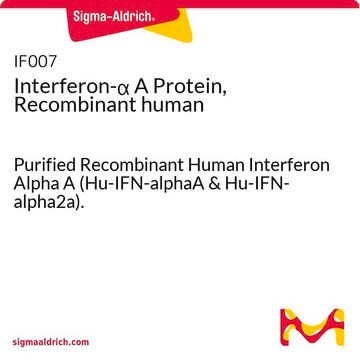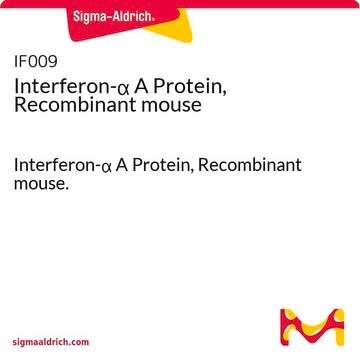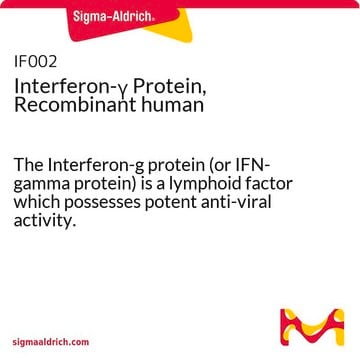SRP4596
IFN-alpha 1 human
recombinant, expressed in E. coli, ≥95% (SDS-PAGE), ≥95% (HPLC)
Synonym(s):
IFN-α 1, IFNA1, Interferon-α
Sign Into View Organizational & Contract Pricing
All Photos(1)
About This Item
Recommended Products
biological source
human
recombinant
expressed in E. coli
Assay
≥95% (HPLC)
≥95% (SDS-PAGE)
form
lyophilized
potency
1x10^8 units/mg
mol wt
~19.3 kDa
packaging
pkg of 100 μg
storage condition
avoid repeated freeze/thaw cycles
impurities
endotoxin, tested
NCBI accession no.
UniProt accession no.
shipped in
wet ice
storage temp.
−20°C
Gene Information
human ... IFNA1(3439)
General description
IFN-α1 (interferon α 1) is a type 1 interferon. Human IFN-a1 is a 19.3kDa protein containing 166 amino acid residues. IFN-α1 belongs to the type I interferon (IFN) family and is present in leukocytes. The IFN-α1 gene is mapped to human chromosome 9p21.3.
Application
IFN-alpha 1 human has been used:
- to treat Vero and breast cancer (MDA-MB-231) cells in interferon assay before viral infection
- as a ligand to vaccinia virus B18R protein in analytical size exclusion chromatography
- to treat chikungunya infected human embryonic kidney cell line (HEK293T) to test its effect on Signal transducer and activator of transcription 1 (STAT1) phosphorylation
- as recombinant interferon to treat lung fibroblast cell line (IMR90) to monitor histone chaperone (HIRA) response
Biochem/physiol Actions
IFN-α1 (interferon α 1) is a lymphoid factor that possesses potent anti-viral activity. IFN-α1 interacts with IFNAR1 (interferon α receptor 1) and IFNAR2. The interaction activates JAK1 (janus-activated kinase 1) and tyrosine kinase 2. These events phosphorylate and activate STAT1 and STAT2 (signal transducer and activator of transcription proteins), leading to the upregulation of interferon-stimulated genes some of which encode antiviral proteins. IFN-alpha 1 (IFN-α1) mediates apoptosis in specific tissues. It may be useful in treating laryngeal carcinoma. The interaction of microRNA, miR-181b with IFN-α1, is regarded as a risk factor in systemic lupus erythematosus.
Physical form
Lyophilized without any additives.
Reconstitution
Centrifuge the vial prior to opening. Avoid freeze-thaw cycles.
Reconstitute in water to a concentration of 0.1-1 mg/mL. This solution can then be diluted into other aqueous buffers.
Storage Class Code
11 - Combustible Solids
WGK
WGK 3
Flash Point(F)
Not applicable
Flash Point(C)
Not applicable
Certificates of Analysis (COA)
Search for Certificates of Analysis (COA) by entering the products Lot/Batch Number. Lot and Batch Numbers can be found on a product’s label following the words ‘Lot’ or ‘Batch’.
Already Own This Product?
Find documentation for the products that you have recently purchased in the Document Library.
K Oritani et al.
Cytokine & growth factor reviews, 12(4), 337-348 (2001-09-07)
The type I interferon (IFN) family includes IFN-alpha, IFN-beta, IFN-pi, and IFN-tau. These molecules are clustered according to sequence homologies, use of the same cell surface receptor, and similar functions. IFN-alpha and IFN-beta have a globular structure composed of five
Rajani Rajbhandari et al.
Oncotarget, 6(19), 17805-17816 (2015-07-15)
Glioblastomas (GBMs) are deadly tumors of the central nervous system. Most GBM exhibit homozygous deletions of the CDKN2A and CDKN2B tumor suppressors at 9p21.3, although loss of CDKN2A/B alone is insufficient to drive gliomagenesis. MIR31HG, which encodes microRNA-31 (miR-31), is
Purification and characterization of multiple components of human lymphoblastoid interferon-alpha.
Zoon KC, et al.
The Journal of Biological Chemistry, 267, 15210-15216 (1992)
Xiao-Lei Xin et al.
Medical science monitor : international medical journal of experimental and clinical research, 25, 7100-7114 (2019-09-23)
BACKGROUND Interferon alpha (IFNalpha) exerts its anti-proliferative effect on many human cancers. Among the 13 subtypes of human IFNalpha, IFNalpha-1 subtype has 2 variants, named IFNalpha-1a and IFNalpha-1b, that differ from each other in only 1 amino acid, at residue
Yong-Ling He et al.
BioMed research international, 2020, 4757065-4757065 (2020-05-10)
A previous work has discovered that chromosome 1q32 locus linked to the risk of systemic lupus erythematosus (SLE) and miR-181b located on the susceptibility site with downregulation inversely correlating to its target molecular interferon alpha 1 (IFNA1). The purpose of
Our team of scientists has experience in all areas of research including Life Science, Material Science, Chemical Synthesis, Chromatography, Analytical and many others.
Contact Technical Service






